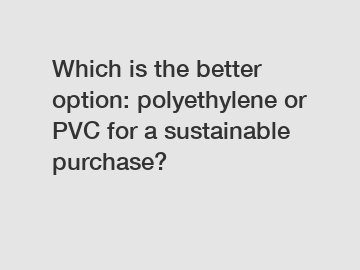Which is the better option: polyethylene or PVC for a sustainable purchase?
Which is the better option: polyethylene or PVC for a sustainable purchase?
When it comes to making sustainable purchasing decisions, it is crucial to consider the environmental impact of the materials involved. Polyethylene and PVC are two common types of plastic used in various products and packaging. In order to determine which option is better for a sustainable purchase, it is essential to delve into their characteristics, production processes, and recycling capabilities.
Polyethylene, a versatile and widely used plastic, has several sustainability advantages over PVC. Firstly, polyethylene is derived from ethane, a natural gas component, making it a byproduct of the petrochemical industry. As a result, it has a lower carbon footprint compared to PVC, which is produced through the polymerization of vinyl chloride, a highly toxic and hazardous chemical. Polyethylene also requires less energy and resources during its production process, further contributing to its sustainability.

Moreover, polyethylene is more easily recyclable. It falls under the resin identification code 2, indicating that it can be recycled into various products such as plastic bottles, bags, and containers. On the other hand, PVC falls under resin identification code 3, which signifies that it is more challenging to recycle due to the presence of chlorine, a harmful chemical. As a result, recycling rates for PVC are typically lower, leading to increased landfill waste and environmental pollution.
The sustainability implications of choosing polyethylene over PVC are significant. By opting for polyethylene, consumers can support a more environmentally friendly plastic industry. The lower carbon footprint and energy requirements associated with polyethylene production contribute to mitigating climate change and reducing reliance on fossil fuels. Additionally, the higher recyclability of polyethylene can help combat plastic waste and promote the circular economy.
Notably, there are certain applications where PVC may still be preferred due to its specific properties. For instance, PVC's durability, chemical resistance, and flame retardancy make it suitable for applications such as pipes, flooring, and electrical insulation. However, for everyday consumer products and packaging where recyclability and environmental impact are paramount, polyethylene emerges as the better option.
In conclusion, when considering a sustainable purchase, polyethylene outweighs PVC in terms of environmental impact and recyclability. Its lower carbon footprint, energy requirements, and higher recyclability make it a more sustainable choice. By opting for polyethylene over PVC, consumers can contribute to a greener future by supporting a plastic industry that promotes resource efficiency and plastic waste reduction.
Are you interested in learning more about wholesale dredge pipe floats, pvc hdpe difference, 8 inch hdpe pipe price? Contact us today to secure an expert consultation!

Comments
0